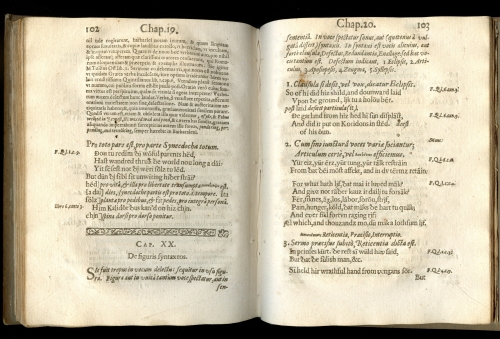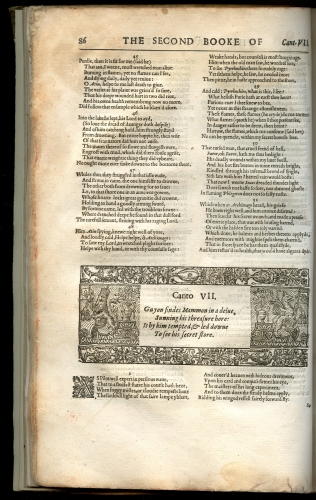'The Childhood Shews the Man'
On 9th December 1608, Milton was born in Cheapside, London. His father, John Milton senior, was a scrivener by profession and a respected amateur composer. The Milton family home resounded with his madrigals and psalm settings, combining an atmosphere of Puritan sobriety with considerable culture.
On turning twelve, Milton began his schooling at St Paul’s, one of the finest grammar schools in the country. Under the tutelage of headmaster Alexander Gil, Milton laid a foundation in classical and biblical learning that would underpin his mature poetry. Thanks to Gil, in addition to the standard humanist curriculum of Latin and Greek, Milton gained an intimacy with the greatest English poets of the previous generation.

Alexander Gil, the Elder (1565–1635) Logonomia Anglica. Qua Gentis sermo facilius addiscitur … Second edition. (London: John Beale, 1621). pp.102-3.
Alexander Gil was Milton’s headmaster at St Paul’s School from 1620 until Milton left for Cambridge in 1624. Gil’s son Alexander (later an accomplished neo-Latin poet) was a contemporary of Milton’s at St Paul’s and they became good friends. Logonomia Anglica is a combined grammar and rhetoric of the English language. The second edition of 1621 (displayed here) was published while Milton was still Gil’s pupil. It pioneers a phonetic system of spelling reform for the English language, which ‘may have influenced Milton’s individualistic spelling: Gil’s “sutl” (instead of subtle or subtil), for instance, may account for Milton’s “suttle”’ (Oxford
DNB). The main text is in Latin, but Gil draws his examples from a variety of English poets, including Daniel, Harington, Sidney, and most frequently Spenser, whose Faerie Queene is no. 2 in the exhibition.

Edmund Spenser (1552-1599) The faerie queen...together with the other works of England’s arch-poët, Edm. Spenser: collected into one volume, and carefully corrected. (London: Matthew Lownes, 1611). Rouse.7.14, sig. H2v
Alexander Gil championed the introduction of vernacular literature into the curriculum, so that English poets such as Edmund Spenser appeared in Milton’s schoolroom alongside Virgil, Homer, Thucydides and other Classical authors. Spenser’s Faerie Queene—an allegorical epic written in the tradition of chivalric romance—is arguably the single English poem that had the greatest influence on Paradise Lost. In a passage of Areopagitica (1644), Milton hails Spenser’s powers as a moral ‘teacher’, with reference to the passage from the Faerie Queene II.vii displayed here:
"Which was the reason why our sage and serious poet Spenser, whom I dare be known to think a better teacher than Scotus or Aquinas, describing true temperance under the person of Guion, brings him in with his palmer through the cave of Mammon, and the bower of earthly bliss, that he might see and know, and yet abstain.
Famously, Milton’s description of Sin’s grotesque deformations in Book II of Paradise Lost owes much to Errour, the female monster killed by the Redcrosse knight at the opening of Spenser’s poem.
